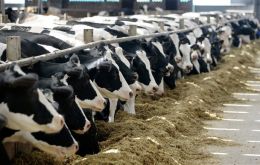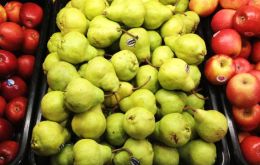MercoPress. South Atlantic News Agency
Agriculture
-
Saturday, June 1st 2013 - 02:51 UTC
Chinese company targets US biggest pork firm in a 7.1bn dollar deal

The biggest pork firms in China and the US plan to join forces in a 4.7bn dollar deal that aims to feed the world's most populous country. China's Shuanghui International has agreed to pay cash for the Virginia-based Smithfield Foods, which including debt, values the firm at 7.1bn.
-
Friday, May 31st 2013 - 07:19 UTC
Despite great agriculture performance Brazil’s economy first quarter result disappoints

Brazil's economy grew 0.6% in the first quarter of 2013, compared with the final quarter of last year, the government said this week. The figure could confirm official projections that the economy would recover following the slowdown experienced over the past two years.
-
Monday, May 27th 2013 - 05:10 UTC
Millions take to the streets world-wide to protest against Monsanto and GM

The United States biotech giant Monsanto says it respects people’s rights to express themselves, but that its genetically-modified seeds improve farm productivity and food quality.
-
Thursday, May 23rd 2013 - 02:10 UTC
Argentine ports strike stalls oilseed and grains exports at peak harvest time

Argentine longshoremen on strike at the peak of summer harvests exports have scores of grains ships delayed in and around due to a three-day-old conflict that threatens to bog down shipments at a time of heightened world demand for South American soy and corn, according to industry sources.
-
Monday, May 20th 2013 - 22:22 UTC
Brazil opens ports to private investment hoping to ease bottlenecks strangling exports growth

Brazil’s Congress approved legislation that opens up state-owned ports to private investment and lifts restrictions on the building of private ports in a bid to eliminate serious bottlenecks strangling the country’s export growth. The Brazilian Association of Infrastructure and Basic Industries praised the approval of the bill and anticipate investment of 25bn dollars.
-
Saturday, May 18th 2013 - 03:01 UTC
Argentina, Brazil and the US form alliance of corn producers: Maizall

Corn groups from the US, Argentina and Brazil signed a memorandum of understanding this week to form an international alliance of corn producers, collectively called MAIZALL.
-
Tuesday, May 14th 2013 - 18:32 UTC
Monsanto wins leading soybean seed replicating case to the relief of biotechnology industry

In a decision that drew sighs of relief from the biotechnology industry, the US Supreme Court ruled that an Indiana farmer violated agribusiness company Monsanto Co’s patent for a type of soybean. The court agreed unanimously with Monsanto that Vernon Bowman, 75, had performed an end-run around the law when he used the company’s patented soybean seeds without seeking a licence.
-
Tuesday, May 14th 2013 - 05:43 UTC
FAO suggests farming and feeding on insects can address global food insecurity

While insects can be slimy, cringe-inducing creatures, often squashed on sight by humans, a new book released by the Food and Agricultural Organization (FAO) says beetles, wasps and caterpillars are also an unexplored nutrition source that can help address global food insecurity.
-
Saturday, May 11th 2013 - 05:36 UTC
Global food prices increased for third month running in April pushed by dairy costs

Global food prices rose in April for a third straight month as surging dairy costs kept upward pressure on the FAO index, but cereal output is expected to be strong this year. Food prices spiked during the summer of 2012 as the United States was hit by a severe drought and dry weather plagued other producers. After falling at the start of 2013, prices have been rising again in the past three months
-
Friday, May 10th 2013 - 05:51 UTC
Argentine fruit and vegetable exports beginning to rebound; Q1 sales reach 477m dollars

The production and sale of Argentine fruits and vegetables is beginning to rebound after a year in which the sector's problems continued to deepen; loss of competitiveness due to rising costs and lower demand, especially overseas because of the global economic crisis.